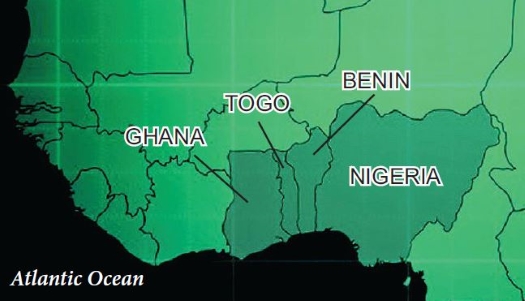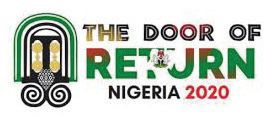Farrakhan’s African influence and the Year of Return to the Motherland
By Jehron Muhammad | Last updated: Jan 29, 2020 - 10:40:26 AMWhat's your opinion on this article?

(L-R) The Honorable Minister Louis Farrakhan, Reverand Leon Sullivan, Kwame Ture
|
Recognizing a winning formula for West Africa in Ghana’s 2019 “Year of Return,” Nigeria and Benin responded with the “Door of Return” and “Gate of Return.”

|
“Door of Return Nigeria 2020” objectives include making Nigeria a key travel destination for the African Diaspora and “African Americans,” working to “rebuild the lost past of the last 400 years” and promoting “investment in Nigeria.”
According to the official Benin government website, “Gate of Return” activity will include hosting a Gate of No Return Marathon and festival in 2020 and 2021.
The vision “is not only to become a symbol of the triumph over slavery, but to heal the wounds slavery left behind and to champion a visceral connection from the diaspora to the motherland,” the website said.
West Africa’s most populous nation seems more interested in facilitating a return of its Nigerian Diaspora, with over 200,000 professionals including medical doctors and engineers living mainly in the U.S. and UK, and has yet to make travel as engaging, as beneficial and as interesting as Ghana. Abdul Akbar Muhammad, who has traveled to over 140 countries, many in Africa, holds the distinction of being the Nation of Islam’s international representative and holds dual citizenship in America and Ghana. He said this “re-ignition” of interest in Africa and the continent’s willingness to accommodate is more than a notion.
“These leaders who pushed the idea of ‘The Year of Return’ and dual citizenship (and) African Americans having homes on the African continent … is not something that just came out of the blue,” he said.

|
Akbar Muhammad, since 1990 with his travel company, has gone on African fact-finding missions and has facilitated nearly 4,000 travelers to the continent. “Many African leaders felt a sense of guilt and some even shame that the president (Donald Trump) of the strongest country in the world would call their continent a ‘sh-t hole,’ ” he said. Akbar Muhammad feels Trump’s vile comment was a touchstone moment for Africa, Ghana, and a lack of outreach toward the Black Diaspora.
Trump’s comment was also perceived as a culmination of the U.S. and Europe’s increasing anti-Islam, anti-Black, anti-immigration climate and growing nationalism.
Nation of Islam Minister Louis Farrakhan, Kwame Ture (also known as Black Power leader Stokely Carmichael) and Rev. Dr. Leon Sullivan are three of the most important proponents of unity between Africa and the African Diaspora.
Dr. Sullivan was creator of the biennial, African-African American Summits of the 1990s that facilitated much needed dialogue and brought together Black American leaders and organizations with African leaders and heads of state.
Akbar Muhammad said Min. Farrakhan’s fame on the African continent blossomed after the historic 1995 Million Man March. And, Akbar Muhammad said, the Minister’s World Tour directly after the march, which included much of Africa, became the icing on the cake.
But Min. Farrakhan’s and the Nation of Islam’s growing influence on the continent had already begun. The Nation of Islam’s International Saviours’ Day Convention in 1994 in Accra, Ghana, drew nearly 2,000 members of the African Diaspora, mostly from the United States, who traveled to Ghana to be part of the historic gathering. During the convention, Ghanaian President Jerry John Rawlings, who played host, twice addressed the gathering.
Prior to that, as early as 1986, Min. Farrakhan addressed Ghana’s military after meeting with President Rawlings. Obviously impressed by the presentation, the president invited the Minister to attend the 80th year anniversary of Dr. Kwame Nkrumah’s birth, where he was again invited to make remarks. After the lecture during a meeting, President Rawlings asked the Minister if he had opened an NOI office anywhere on the African continent. The Minister responded that he had not. President Rawlings asked if the Minister would consider opening an office in Ghana? Min. Farrakhan responded that he would. Akbar Muhammad said sometime later the Minister, while they were back in Ghana, asked him if he’d open an NOI office in Ghana? Akbar Muhammad responded in the affirmative. Not only did he set up the office beginning in June 1990, but for the next 10 years he took up residence in Ghana.
Min. Farrakhan’s influence on the continent was also increased by his involvement in helping negotiate conflicts between African leaders. During 1994 talks in Kampala, Uganda, that included Sudan People’s Liberation Army leader John Gurang and President Yoweri Museveni of Uganda, Min. Farrakhan was initially involved. The talks were designed to help settle the longstanding conflicts between North and South Sudan. Both Museveni and Gurang, according to Akbar Muhammad, had very high regard for Min. Farrakhan and his ability to act as a “neutral arbiter.” They were preparing for Intergovernmental Authority on Development-hosted peace talks in Kenya. But the American ambassador to Sudan, Donald K. Peterson, “didn’t want Farrakhan involved,” said Akbar Muhammad. In fact, Akbar Muhammad added, it was “reported to me … the talks would actually discontinue unless Minister Farrakhan was removed from the discussion.” IGAD members obviously had bowed to the wishes of the U.S. ambassador. Not wanting to be “where he was not wanted,” Min. Farrakhan left the talks.

|
Perhaps Min. Farrakhan’s most significant African leadership relationship and friendship was the one he developed with Libyan leader Muammar Gadhafi. Not only did Col. Gadhafi lend the NOI $5 million and proposed giving the Nation $1 billion to help with its work of reform and uplift, Min. Farrakhan became the deputy leader of the Islamic Peoples Leadership, a charity organization that Gadhafi chaired. Min. Farrakhan’s position meant that he’d chair the work of the organization when Col. Gadhafi was not available.
When civil war broke out in the Democratic Republic of Congo, Min. Farrakhan and Zambia’s President Kenneth Kaunda, during a peace-making mission for the Congo sponsored by Col. Gadhafi, met with the heads of state of South Africa, Uganda, Sudan, Namibia and Senegal.
Welcome home to Ghana
In 2019 in Ghana, nearly 130 Black Americans and Afro-Caribbeans posed as President Nana Akufo-Addo congratulated the new citizens of his West African nation.
During the Year of Return, Ghana welcomed more foreign visitors, nearly one million, than ever before in its post-independence history. The African Diaspora seems to be buying into the idea of visiting or moving to Ghana with increasing predictable, positive trade and investment results.
In 2018, its neighbor Nigeria recorded $1.9 billion in FDI (foreign direct investment) inflows, down sharply from $3.5 billion in 2017. Ghana, in comparison, recorded $3.5 billion in 2018, up from $3.2 billion in 2017—a remarkable feat for a country with a population six times smaller than Nigeria.
(Follow @jehronmuhammad on Twitter.)
INSIDE STORIES AND REVIEWS
-
-
About Harriett ... and the Negro Hollywood Road Show
By Rabiah Muhammad, Guest Columnist » Full Story -
Skepticism greets Jay-Z, NFL talk of inspiring change
By Bryan 18X Crawford and Richard B. Muhammad The Final Call Newspaper @TheFinalCall » Full Story -
The painful problem of Black girls and suicide
By Charlene Muhammad -National Correspondent- » Full Story -
Exploitation of Innocence - Report: Perceptions, policies hurting Black girls
By Charlene Muhammad -National Correspondent- » Full Story -
Big Ballin: Big ideas fuel a father’s Big Baller Brand and brash business sense
By Bryan Crawford -Contributing Writer- » Full Story






 Click Here Stay Connected!
Click Here Stay Connected!








